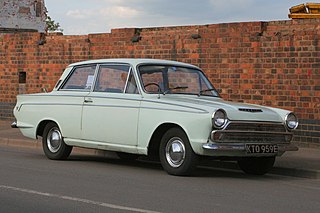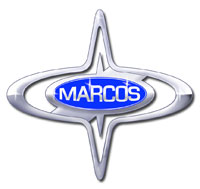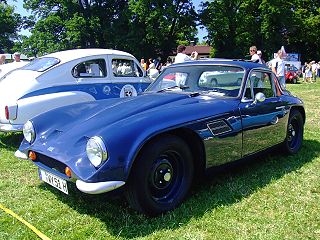
A Locost is a home-built car inspired by the Lotus Seven. The car features a space frame chassis usually welded together from mild steel 1 in × 1 in square tubing. Front suspension is usually double wishbone with coil spring struts. The rear is traditionally live axle, but has many variants including independent rear suspension or De Dion tube. Body panels are usually fibreglass nose and wings and aluminium side panels. Each car is highly individualized according to the resources, needs and desires of each respective builder.

The Lotus Seven is a sports car produced by the British manufacturer Lotus Cars between 1957 and 1973. The Seven is an open-wheel car with two seats and an open top. It was designed by Lotus founder Colin Chapman and has been considered the embodiment of the Lotus philosophy of performance through low weight and simplicity. The original model was highly successful with more than 2,500 cars sold, due to its attraction as a road legal car that could be used for clubman racing.

The Ford Anglia is a small family car that was designed and manufactured by Ford UK. It is related to the Ford Prefect and the later Ford Popular. The Anglia name was applied to various models between 1939 and 1967. In total, 1,594,486 Anglias were produced. It was replaced by the Ford Escort.

The Ford Cortina is a medium-sized family car manufactured in various body styles from 1962 to 1984. It was the United Kingdom's best-selling car of the 1970s.

Marcos Engineering was a British sports car manufacturer. The name derives from the surnames of founders Jem Marsh and Frank Costin.

The Ford Zephyr is an executive car manufactured by Ford of Britain from 1950 until 1972. The Zephyr and its luxury variants, the Ford Zodiac and Ford Executive, were the largest passenger cars in the British Ford range from 1950 until their replacement by the Consul and Granada models in 1972.

The Ford Fox platform is an automobile platform that was used by Ford Motor Company from the 1978 to 1993 model years. Originally introduced to underpin compact sedans, the Fox architecture was utilized for a wide variety of vehicle designs for Ford and Lincoln-Mercury vehicles. Serving as the direct replacement for the long-running Ford Falcon architecture, the downsizing of intermediate-size cars expanded its use, with the Fox platform also replacing the Ford Torino platform. For the 1980s, the chassis came into wider use, supporting both the Ford Mustang and the Ford Thunderbird.

Elva was a sports and racing car manufacturing company based in Bexhill, then Hastings and Rye, East Sussex, United Kingdom. The company was founded in 1955 by Frank G. Nichols. The name comes from the French phrase elle va.

Locust is a kit car inspired by the Lotus Seven. It was first developed in the mid 1980s as a cheap kit car to be built onto the chassis of a Triumph Spitfire, it was later developed into a full kit car which used its own fully designed ladder chassis - unlike others using space frame. The car was famed for its cheap to build construction using marine ply for the body, which was then covered with aluminium sheeting, the last kits were produced in early 2000.
Dutton Cars, based in Worthing, Sussex, England, was a maker of kit cars between 1970 and 1989. In terms of number of kits produced, it was the largest kit-car manufacturer in the world.

Devin Enterprises was an American automotive manufacturer that operated from 1955 to 1964. Devin was mainly known for producing high quality fiberglass car bodies that were sold as kits, but they also produced automotive accessories as well as complete automobiles. The company was founded by Bill Devin.
Sylva Autokits is a kit car manufacturer based in Lincolnshire, England. Sylva was founded in 1981 by Jeremy Phillips and has developed and produced a number of small and lightweight sports cars. Sylva cars have won a number of 750 Motor Club Kit Car championships.

Marlin is a British sports car manufacturer founded in 1979 in Plymouth as Marlin Engineering and now located in Crediton, Devon, England.

The TVR M series is a line of sports cars built by automaker TVR between 1972 and 1979. The series replaced the outgoing TVR Vixen and Tuscan models, and is characterized by a common chassis and shared body style. As with other TVR models before and since, the M-series cars use a front mid-engine, rear-wheel drive layout and body-on-frame construction. The bodies themselves were built from glass-reinforced plastic (GRP). The era of the M series is commonly associated with Martin Lilley who, together with his father, took ownership of the company on 30 November 1965.

The TVR Vixen is a hand-built sports car which was produced by TVR in Blackpool, England from 1967 until 1973. Ford-engined in most of its configurations, it succeeded the MGB-engined TVR Grantura 1800S. It is also the basis for the high-performance TVR Tuscan which was available in both V6 and V8 configurations.

Haynes Roadster is a replica of a Lotus Seven home-built car, according to the book Build Your Own Sports Car: On a Budget by Chris Gibbs (ISBN 1-84425-391-0). A Ford Sierra is used in the car as a donor for drivetrain and suspension components.

Eagle Cars Limited was an English company, based in Lancing, West Sussex, originally operated by Allen Breeze, although it has undergone a number of ownership changes since. Originally making a Jeep lookalike called the RV, between 1981 and 1998 they built several iterations of a gull-winged car called the Eagle SS. The SS was based on an American kit car called the Cimbria, and was brought to the UK by Tim Dutton. In 1988 Eagle Cars moved inland, to nearby Storrington.
Mills Extreme Vehicles (MEV) is a kit car design and manufacturing company based in Gloucestershire, England, founded in 2003 by Stuart Mills and Julie Wilson.

New Zealand had a long history of small garages and vehicle enthusiasts modifying and creating sports and sports racing cars. Out of these interests grew the New Zealand kit and replica car industry with the introduction of fibre-glass car bodies in the 1950s.
The Ginetta G26 and its derivatives, the 'G28, G30, and G31, are a series of two-door sports cars, designed, developed, and manufactured by British company Ginetta, from 1984 to 1992, primarily in kit form. All models are based on Ford mechanical components. They differ in length as well as in different bodies and engines. All variants together, about 360 vehicles were built in eight years.



















